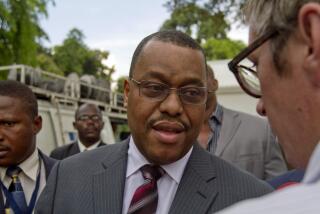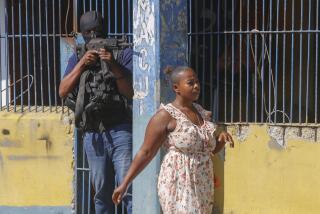Haitian Army Chief Says He Won’t Quit U.N. Talks : Caribbean: He and ousted President Aristide must meet to work out country’s future, general declares.
- Share via
NEW YORK — Lt. Gen. Raoul Cedras, the army chief who overthrew Haitian President Jean-Bertrand Aristide almost two years ago, squelched rumors of his impending walkout from U.N. negotiations on Governors Island on Tuesday and proclaimed that he and Aristide must meet face to face “to assure the future of our country.”
So far, the two antagonists have not met in these unusual negotiations at a Coast Guard base on the small island in New York harbor just off the southern tip of Manhattan.
The meeting has not taken place because U.N. mediator Dante Caputo, a former Argentine foreign minister, has failed in many hours of discussion to persuade Cedras to announce an unconditional resignation and allow the immediate return of Aristide.
To complicate matters, Aristide insists that, as president, he will not engage in any bargaining sessions with Cedras and is prepared to share a meeting room with his enemy only when the time comes to sign the final agreement.
Cedras told a news conference on a lawn outside the Coast Guard Officer’s Club that there is no obstacle to Aristide’s return.
“We have made the trip all the way here with Mr. Aristide--or if you prefer, President Aristide,” he said, “to establish with him the conditions for his return, conditions which must ensure the security of all sectors in Haiti.”
But, speaking in French, Cedras was coy with all questions about the chances that he would resign, as Aristide and his supporters have demanded.
Diplomatic sources reported that Cedras had told Caputo he would resign provided that, first, a rival, Port-au-Prince police chief Joseph Michel Francois, resign at the same time, and, second, that the rest of the army command be allowed to keep their posts.
Questioned about this, Cedras said that personalties do not matter.
“Both myself and Mr. Aristide will pass away when God wants us to,” he said, “but Haiti will live forever. . . . We are not discussing details about personalities. We are discussing the future of our country.”
There have been so many rumors about the talks being stalemated or breaking up that U.N. negotiator Caputo warned journalists about jumping to conclusions.
“Any reports of specific ideas can be very misleading,” he said, “particularly if they are presented outside the broader context of the entire negotiating process.”
The Cedras news conference, vague as it was, led to some optimism in the Aristide camp. Jean Casimir, Aristide’s ambassador to the United States, said the two sides now appear close to an agreement on an agenda. Casimir said he was “happy that (Cedras) was prepared to continue negotiations.”
But Casimir also repeated that Aristide would not meet Cedras until the agreement is ready for signing.
“We view such a meeting as a celebration, and we have nothing to celebrate yet,” he said.
According to diplomatic sources, Cedras appears intent on leaving the army command almost intact as a counterweight to an Aristide civilian government. He also does not want Aristide to reach down into officer ranks to pick a new commander, the sources said; instead he wants a voice both in choosing his successor and in naming a new prime minister.
Cedras, according to the sources, also proposed that it take six to nine months for Aristide to return.
More to Read
Sign up for Essential California
The most important California stories and recommendations in your inbox every morning.
You may occasionally receive promotional content from the Los Angeles Times.










